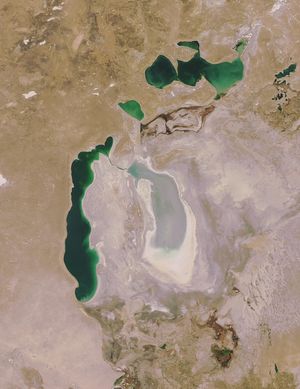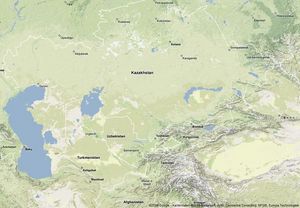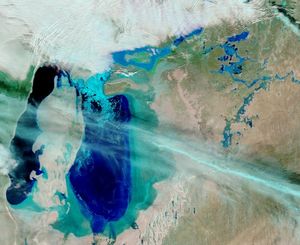Portrait
Background
The six Central Asian States Kyrgyzstan, Uzbekistan, Tajikistan, Turkmenistan, Kazakhstan and Afghanistan face various water-related problems which bear a high potential for conflicts.
Water is the key factor for economic development in the Central Asian region, but its resources are distributed unevenly and its use differs widely.
While the states in the mountainous upper reaches of the major rivers Amu Darya and Syr Darya are rich in water resources and use the river water mainly for energy production in winter, the downstream states mainly need the water to irrigate cropland in summer. The situation is aggravated by out-dated irrigation infrastructures, such as leaky irrigation channels, and inefficient irrigation methods which cause high losses of valuable water.
Salinization of soil and groundwater are the consequences of the inappropriate irrigation system. The withdrawal of large amounts of water from the main rivers enhanced desertification processes and caused the well-known ecological catastrophe of the Aral Sea.
Sound water management decisions require a reliable hydro-meteorological data basis. Unfortunately, after the collapse of the Soviet Union in the 1990ies, the existing hydro-meteorological monitoring network degraded too. Many monitoring stations were abandoned due to lacking financial support by the new independent republics. The remaining stations are often equipped with out-dated sensors which provide only non-digital data of low temporal resolutions.
Yet, only reliable data that are accessible to all Central Asian states have the potential to build trust and lead to sustainable water management strategies agreed by all states.
In addition to the prevailing issues, climate change represents a considerable uncertainty factor with respect to the future dynamics of water resources and water-related disasters. While the retreat of the glaciers in the Tien Shan and Pamir mountains has been observed since the 1970ies, the impact of this process on river runoff is still to be cleared in detail. Nevertheless, the frequency, seasonality and magnitude of water-related disasters are expected to alter forced by changing climatic drivers.
Our motivation
The political dimension of water is to be addressed by political institutions. Only multinational administrative approaches will be able to confine if not avoid water conflicts and stabilize the region substantially.
Still, scientific research may serve as a catalyst for interstate cooperation on political and administrative levels. In addition, only science will be able to provide the reliable data basis that is needed to come to sustainable decisions in water management.
The CAWa-Green project (as a follow-up to CAWa) is going to contribute to this process and establish a spirit of cooperation between the participating institutions from Central Asian states.
Objectives
The CAWa-Green project aims at providing a sound scientific basis for trans-national water resources management in Central Asia.
The planned research activities will involve a network of scientific institutions in Central Asia. They will produce joint scientific results as well as pass down up-to-date scientific methods and approaches.
Within CAWa-Green, up-to-date hydro-meteorological data will be delivered to decision makers in Central Asia. These data are of real-time character occupied by satellite communication to deliver data to the operation centre of the monitoring network and to the participating stakeholders.
The hydro-meteorological data provided by the new stations that are installed in the frame of the CAWa-Project, the data from remote sensing and GNSS as well as the results of the scientific studies are accessible to all partners via http://sdss.caiag.kg/sdss/. Thus, CAWa-Green contributes to a reliable data basis on water resources in Central Asia.
In addition, the developed methods and tools in CAWa will be passed to Central Asian professionals from science and administration in training courses.
The partners
GFZ German Research Centre for Geosciences in Potsdam has taken over the project coordination. The partners involved in CAWa-Green up to now are listed here. New partners from science, water management, administration or other water-related projects in Central Asia are welcome to join!
Funding
The project CAWa-Green is funded by the German Federal Foreign Office. It is part of the “Green Central Asia Initiative” to Central Asia. The previously accomplished CAWa-Project was financed by the German Water Initiative for Central Asia (the so-called "Berlin process"), which the German Federal Foreign Office launched on 1 April 2008 in order to support peaceful, sustainable and mutually beneficial management of transboundary water resources in Central Asia. The Initiative’s prime objective is to make water a subject of intensifed regional cooperation and thereby set in train a process of political rapprochement in Central Asia that leads to closer cooperation in the use of scarce water resources.
The activities of the CAWa-Green include national, bilateral and regional projects and take place on three levels:
- on the scientific-technical level, jointly with the PIK (Potsdam Institute for Climate Impact Research) they aim to establish reliable data bases, support measures designed to enhance efficiency and develop new technical solutions;
- on the political-institutional level, they aim to support effective institutions for water management and coherent policies (implemented by the GIZ programme "Transboundary Water Management in Central Asia"
- and on the level of capacity building, they aim to develop the professional capacities that are necessary for integrated water resources management (implemented by DKU the German-Kazakh University).


